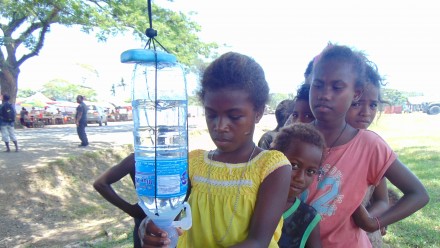Clean water for all
Share
Most Australians take for granted clean runinng water for drinking, cooking, and handwashing. At NCEPH, this World Water Day we are raising awareness of the billions of people around the world who do not have access to basic handwashing facilities - the most important weapons we have against COVID-19 and a myriad of other infectious diseases such as gastrointestinal infections like salmonella and intestinal parasites.
Professor Darren Gray, an infectious disease epidemiologist and Head of the Department of Global Health, leads major research programs investigating the impact of water, sanitation and hygiene on infectious diseases.
“We develop and/or evaluate water and sanitation interventions as well as hygiene education programs alone and in combination that aim to control and eliminate infectious diseases in the Asia-Pacific,” says Gray.
One project the team is currently working on is the evaluation of a silicon water bottle attachment that transforms bottles into a flow controllable portable tap, called SPATAP.
“We’re always looking for innovative low-cost and efficient solutions that can improve the health of people living in remote communities. SPATAP is one such solution that we’re evaluating for hand washing for populations where water is scarce,” says Gray.
Dr Aparna Lal, an environmental health expert who is leading the SPATAP evaluation, is keen to help address hygiene inequality.
“World Water Day reminds us that clean, running water is essential to save lives. Water access is a global issue that demands collective action now,” says Lal.
Indeed COVID-19 has highlighted not only the critical role hand hygiene plays in disease transmission, but the global inequality in access to basic sanitation and hygiene measures.
“The pandemic presents an opportune time to make sure that water access becomes universal. Climate change further amplifies the risks posed by unsafe and inadequate water supplies. SPATAP will initially be rolled out across schools in urban and rural areas in Fiji. By regulating the amount of water that dispenses, SPATAP will help ensure that more children can wash their hands with a limited amount of water,” says Lal.
** Learn about more projects undertaken by the RSPH Global Health Team and Environment, Climate and Health Team, including current COVID-19 activities, and sanitation works in Indonesia.
*** Find out how SPATAP, as invented by Stuart Mason, is being implemented in Rotary’s Hand Hygiene for Health program using or watch their video.
**** For more information about Global Handwashing Day visit their website at: https://globalhandwashing.org/global-handwashing-day/
By Liz Drummond.















